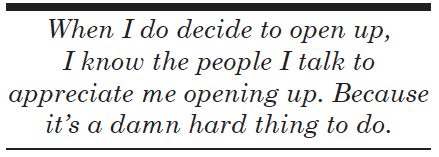When I heard Josh Radnor, also known as Ted Mosby from “How I Met Your Mother,” was coming to campus, I was stoked. Since I’m a fan who has faithfully followed his plights and shenanigans through all nine seasons, I jumped in line on Monday night at 6 p.m. to get my ticket.
After waiting for 20 minutes, Campus Programming Board (CPB) told me no more tickets would be distributed today and that I had to come back at noon the next day to “try” to get a ticket. The tickets that would be handed out would be given to those who were first in line, and the rest had to try again another day.
I had a random flashback of when I was little, and I saw “Charlie and the Chocolate Factory” for the first time. Willy Wonka went a little crazy and stuffed five golden tickets into five random candy bars and sent them off into the world. Millions of small children wanted those five little golden tickets and so everybody started buying his candy just so they could have a chance. Willy Wonka was an asshole.
So as I walked away on Monday, ticketless, I felt like little Charlie after he opened the first candy bar after paying for it and found no golden ticket.
There are only 300 total “free” tickets to see Radnor on March 19. More than one hundred of the tickets were given away at CPB’s showing of “Liberal Arts” in the Milligan Hub last Saturday and approximately 60 are set aside for what I assume are Radnor’s guests, members of CPB and prospective students.
I’m no mathematician, but that means there are approximately 140 tickets left. And, minus the one hundred students who received tickets at last weekend’s screening, there are potentially 1,700 students who want these 140 tickets.
Houston, we have a problem.
Arguably, not everyone will want to see Radnor and not everybody watches “How I Met Your Mother.” But undeniably, the show has a huge fan base and the main reason Radnor was invited to campus is because the show is so popular. And undeniably, all 1,800 students, whether they get a ticket or not, have paid the student activity fee of $260. So, although the tickets are advertised as free, they were paid for through the activity fee.
The cynic in me wants to remind everyone that nothing is free. Supposedly, it cost $24,000 for Radnor to come to campus. That’s about $13 per student or $100 per ticket, since only 240 tickets are available. So, unless CPB is only deducting $100 from the accounts of students who actually get tickets, everyone is paying for less than one-sixth of the student body to see this celebrity.
There’s more to it. Radnor’s visit was not paid strictly through this year’s activity funds. Money was left over from previous years. So students who have been here in previous years, and who don’t receive a ticket, pay even more for nothing.
How’s that for legen-wait for it-dary?
I’d also like to point out that the student body pays for celebrities such as Radnor to come to campus but does not vote on who visits campus. The decision is made by few who should take the entire student body into consideration before their own wants. If they thought only 240 students would want to see Radnor’s performance, they should not have used $24,000 of the students’ money to bring him here.
My recommendation is this: move the show from the Chappelear Drama Centre Main Stage to Gray Chapel. Although the Main Stage is a beautiful and appropriate setting for a celebrity, it can’t fit all of the students who have paid the activity fee and want to see Radnor speak. That way, every student who wants to see him and who can’t get a ticket has an equal opportunity.
